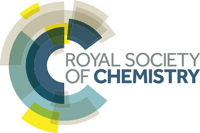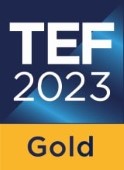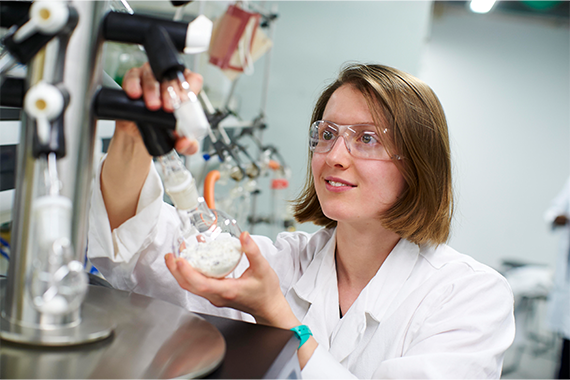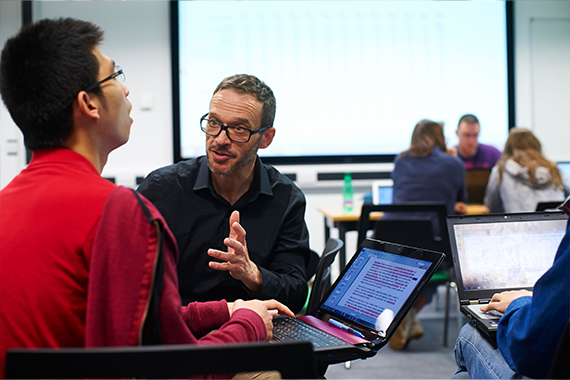
Learn how the natural environment functions to evaluate the impact of human activities across the globe.
Year of entry: 2024/25
F143
Y50
4 years full-time
A*AA-AAB (full entry requirements)
September 2024 (semester dates)
Book your place for our Open Days on Saturday 22 and Sunday 23 June.
Book your placeChemistry is often referred to as the 'central science' as it covers topics as diverse as quantum mechanics and the study of atomic particles, to the molecular nature of biological systems and the Human Genome Project.
Environmental change raises important concerns over the future wellbeing of our planet. Although it is apparent that some changes result at least in part from human activities, it is equally clear that natural variations also play a major role.
This course will give you the opportunity to learn about the chemical basis of the environment and to understand our impact upon it.

This course is accredited by the Royal Society of Chemistry, assuring the quality of our teaching. This course meets the academic criteria for Chartered Chemist (CChem) status.
in the 2024 Complete University Guide
Spend a year working on a research project at one of our partner universities in countries all over the world.
Tailor your course to your interests with our wide range of option modules.
Each year you'll take a range of core modules which balance a good understanding of the basic principles of chemistry with specialist modules which focus on atmospheric and environmental processes. There are plenty of opportunities to see the exciting contributions chemistry can make in the modern world.
We aim to break down the artificial barriers between different branches of chemistry, helping you to understand chemistry as a unified discipline with common underlying principles.
Our chemistry courses are designed to be flexible, so you can transfer between MChem and BSc courses at any time during the first two years. The title of your final degree will depend on the modules you take from Year 2 onwards.
There are other opportunities for you to spend time abroad during your course:
There are opportunities to spend time in industry as part of this course.
You will take a set of core modules, each of which integrates the major areas of Chemistry: organic, inorganic, physical, theoretical, analytical and biological.
You'll begin with themes of structure and bonding, and chemical change and reactivity, with practical courses complementing the lectures, and then take interdisciplinary modules that introduce key chemical principles in the areas of spectroscopic analysis, bonding and chemical change, and chemical reactivity and mechanisms.
You will carry out experiments in analytical and physical chemistry, and an integrated chemistry project as an introduction to research.
You will study six core modules:
In addition to the above you will also need to complete our online Academic Integrity module.
This module covers some of the essential skills and knowledge which will help you to study independently and produce work of a high academic standard which is vital for success at York.
This module will:
A significant proportion of your second year is made up of core Chemistry modules and practical work which is common to all our Chemistry courses. Your specialist module Dynamic Earth introduces the chemical foundations of a range of natural processes.
You will study six core modules:
You may be able to replace one option module with an elective module, studying a complementary subject, a language or an interdisciplinary topic.
You will continue your studies through a series of core modules in advanced inorganic, organic and physical chemistry. The specialist module Atmospheric Chemistry looks at the chemical and physical processes important in controlling the concentration of pollutants in the atmosphere.
You will study six core modules:
You may be able to replace one option module with an elective module, studying a complementary subject, a language or an interdisciplinary topic.
You'll spend your final year working on a research project at one of our overseas partner universities.
You will have a personal supervisor at your host institution, and regular contact from a supervisor at York.
You will carry out a research project focusing on atmospheric and environmental chemistry. Recent projects have investigated:
Our modules may change to reflect the latest academic thinking and expertise of our staff.
Every course at York has been designed to provide clear and ambitious learning outcomes. These learning outcomes give you an understanding of what you will be able to do at the end of the course. We develop each course by designing modules that grow your abilities towards the learning outcomes and help you to explain what you can offer to employers. Find out more about our approach to teaching and learning.
| UK (home) | International and EU |
|---|---|
| £9,250 | £28,800 |
The level of fee that you will be asked to pay depends on whether you're classed as a UK (home) or international student. Check your fee status.
For more information about tuition fees, any reduced fees for study abroad and work placement years, scholarships, tuition fee loans, maintenance loans and living costs see undergraduate fees and funding.
We'll confirm more funding opportunities for students joining us in 2024/25 throughout the year.
You can use our living costs guide to help plan your budget. It covers additional costs that are not included in your tuition fee such as expenses for accommodation and study materials.
Get a taste of university-level study on one of York's free short courses, including our award-winning subject course, 'Exploring everyday chemistry'.

Our teaching, learning and student experience is outstanding, recognised by a Gold rating from the Office for Students in the 2023 national assessment (Teaching Excellence Framework).
You’ll study and learn with academics who are active researchers, experts in their field and have a passion for their subjects. Our approach to teaching will provide you with the knowledge, opportunities, and support you need to grow and succeed in a global workplace. Find out more about our approach to teaching and learning.
Lectures range from the traditional 'chalk and talk' to the use of digital presentations. Where possible we include demonstrations and encourage audience participation through chemical quizzes and voting.
The size of lectures varies from 200 students to as few as five for some option modules. All teaching is done by our academic staff - many of whom are at the forefront of their fields and will discuss the latest developments in their area.
Tutorials are our smallest group teaching sessions and are usually one hour in length. Up to five students join a college tutor who is a specialist in the subject. Tutorials develop a wide range of skills including:
Tutorials help to reinforce topics covered in lectures, and offer an opportunity to discuss aspects of the subject which interest you and ask about any problems encountered in your reading.
Up to 25 chemists in the same teaching college are divided into small groups to work through problem sheets, usually over one or two hours.
Practical chemistry complements your theoretical studies and constitutes most of the continuously-assessed parts of your degree.
A wide variety of experiments are carried out, from the synthesis of target compounds to a crime-scene investigation using forensic methodology. You will gain experience in handling and interpreting experimental data, and discover how principles taught in lectures can be put to use.
As the course progresses, you have an increasing range of choice in the experiments you do. In the summer term of the first year you will do the 'Chemistry of a Night Out' practical where you will plan and carry out experiments as part of a team.
In your first year, you can expect:
| Lectures | 9-10 hours per week |
|---|---|
| Tutorials | 1 hour per week |
| Workshops | 2-3 hours per week |
| Practicals | 6 hours per week |
These figures are representative of a typical week. Your contact hours will vary throughout the year due to your module choices, non-compulsory classes, exam periods and changes to scheduled activities.
Outside your timetabled hours, you'll study independently. This may include preparation for classes, follow-up work, wider reading, practice completion of assessment tasks, or revision.
In the UK, full-time students are expected to spend 1,200 hours a year learning. That's about 40 hours of classes and independent study each week during semesters. Everyone learns at a different rate, so the number of hours you spend on independent study will be different to other students on your course.
You will be based in the Department of Chemistry on Campus West. Your teaching will mostly take place in the Department, with some classroom sessions elsewhere on Campus West.
Our beautiful green campus offers a student-friendly setting in which to live and study, within easy reach of the action in the city centre. It's easy to get around - everything is within walking or pedalling distance, or you can use the fast and frequent bus service. Take a campus tour.
You'll be assessed in a number of different ways, depending on the modules you study. Forms of assessment include:
We pride ourselves on delivering useful written and verbal feedback to all of our students. Whenever you complete an assessment, you will receive feedback on its good and bad points, and guidance on how you can improve further.
You'll also receive feedback on assignments which don't count towards your final grade, helping you to understand your strengths and identify areas for improvement.


Although the majority of our graduates progress to become scientists, the analytical and transferable skills which constitute part of our degrees are recognised as suitable training for a wide range of careers.
About 40 graduates per year stay in the Department or join other universities to work for higher degrees. Most are involved in collaborative research projects, many with chemical companies.
| Typical offer | |
|---|---|
| A levels |
We accept the following science/mathematics subjects: Biology, Electronics, Environmental Science, Geology, Mathematics, Further Mathematics, Computer Science and Physics. |
| Access to Higher Education Diploma | 39 credits at Distinction including at least 15 in Chemistry-related units, 15 in a second Science (Biology, Mathematics or Physics) and 6 at Merit or higher. |
| BTEC National Extended Diploma | DDD and an additional A level or equivalent qualification in Chemistry |
| Cambridge Pre-U | D3, D3, M2 including D3 in Chemistry, plus two other sciences/mathematics or D3, D3, D3 including Chemistry and one other science/mathematics or D2, D3, D3 including Chemistry. |
| European Baccalaureate | 80% overall, including a minimum grade of 85% in Chemistry |
| International Baccalaureate | 35 points including grade 6 in both Chemistry and another science/mathematics at Higher Level, or 36 points including grade 6 in Chemistry at Higher Level and grade 6 in at least one other science/mathematics at Standard Level |
| T levels | We are currently not accepting T Levels for this course unless an additional A Level (or equivalent qualification) in Chemistry has been taken. |
| Scottish Highers / Advanced Highers | Depending on your combination of qualifications Advanced Highers - A or B in Chemistry plus Scottish Highers - ABBB or BBBB We may also be able to consider three Advanced Highers or a combination of Highers and Advanced Highers, where an applicant does not meet the grade requirement through Highers alone. Please contact us to discuss your qualifications. |
| International foundation programme | Foundation Certificate from our International Pathway College or an appropriate alternative. |
| Other international qualifications | Equivalent qualifications from your country |
If you're planning to spend your final year in Europe you should have a GCSE in a relevant language at grade 5/6 (B).
Meeting the following additional criteria may qualify you for an alternative offer.
| Criteria | Adjustment |
|---|---|
| Widening participation | If you successfully complete one of the following programmes, you may be eligible for an alternative offer up to three A level grades (or equivalent) below our typical offer: Black Access Programme, Next Step York, Realising Opportunities, YESS, YorWay to York. More about widening participation. |
| Contextual offers | If you have experience of local authority care or live in an area with low progression to university, you may be eligible for an alternative offer up to two A level grades (or equivalent) below our typical offer. More about contextual offers. |
| EPQ | We recognise the value of this qualification although it will not be included as a condition of entry. It may be taken into consideration when you receive your results. |
If English isn't your first language you may need to provide evidence of your English language ability. We accept the following qualifications:
| Minimum requirement | |
|---|---|
| IELTS (Academic) | 6.5, with a minimum of 6.0 in each component |
| Cambridge CEFR | 176, with a minimum of 169 in each component |
| Oxford ELLT | 7, with a minimum of 6 in each component |
| Duolingo | 120, minimum 105 in each component |
| GCSE/IGCSE/O level English Language (as a first or second language) | Grade C / Grade 4 |
| LanguageCert SELT | B2 with a minimum score of 33/50 in each component |
| LanguageCert Academic | B2 Communicator with a minimum score of 33/50 in each component |
| KITE | 459 Main Flight score with 426 in each component |
| Skills for English | B2: Merit overall, with Pass with Merit in each component |
| PTE Academic | 61, with a minimum of 55 in each component |
| TOEFL | 87 overall, with a minimum of 21 in each component |
| Trinity ISE III | Merit in all components |
For more information see our undergraduate English language requirements.
You may be eligible for one of our pre-sessional English language courses. These courses will provide you with the level of English needed to meet the conditions of your offer.
The length of course you need to take depends on your current English language test scores and how much you need to improve to reach our English language requirements.
After you've accepted your offer to study at York, we'll confirm which pre-sessional course you should apply to via You@York.

We offer a range of campus accommodation to suit you and your budget, from economy to premium.

Explore campus and city life and hear what our current students have to say about living here.

Lively, full of culture and beautiful, York is regularly voted one of the best places to live and visit in the UK.

Find out more about York. Chat to staff and students and take the tour, on campus or online.